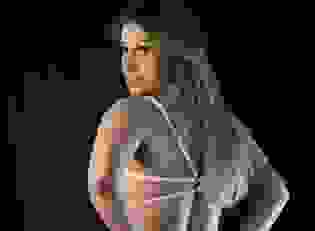Note: You can change font size, font face, and turn on dark mode by clicking the "A" icon tab in the Story Info Box.
You can temporarily switch back to a Classic Literotica® experience during our ongoing public Beta testing. Please consider leaving feedback on issues you experience or suggest improvements.
Click here"It's not my money, Sheriff. If it wasn't for my young friend here, we know how it would have ended. He killed them, he deserves the money. And if you would, write out a bill of sale for the horse, I believe he deserves it."
Rocky was about to say something, but she warned him off with her eyes. They went through channels, and he got the money. He and Viv had a nice dinner at the cafe, and he walked her to her wagon. She was spending the night with a friend, and he was in the local hotel. She held her hand out. "I believe this is goodbye, Mr. McGill. It has been quite the experience meeting you. I wish you the best of luck. I'd like to present you with this, as a parting gift. I bought it this fall, planning to use it as a Christmas present for my husband, but he no longer has need of such things. I wish you a happy and fulfilling life." She handed him, of all things, a hat box.
"As I do you, Mrs. Robinson. I hope you find your happiness, and I will cherish the memory of our time together and what you taught me as long as I live."
She blushed a little, and gave him a short but hard hug. "Godspeed, Rocky McGill."
He watched as she drove down the street until she was almost out of sight, before going into the hotel. He opened the hat box to find a brand new black Stetson, wide brimmed and low crowned, the type of hat a man of means would wear.
.............................................
The next day Rocky rode West, making good time now that he had a horse. He didn't like the animal, it was contrary and high strung, but it beat walking, and as soon as he found the railroad he'd be getting rid of it.
He hit End Of Tracks four days later, just outside a good sized town. Before he sought employment, he stopped by the Wells Fargo office and banked all but his original money belt. The manager was surprised that one so young could have that much, and commented on it. Rocky, a little irritated, braced him.
"Mister, one thing I've learned as I've traveled here is the virtue of minding your own business. I got this money legal, and if you're in doubt you can wire the Sheriff of Buckskin County, and he'll vouch for me. Now, if you don't feel comfortable with my money, give it back and I'll take my business elsewhere."
The manager took in his travel stained clothes, the gun that hung on his hip and the other shoved in his waistband, the look in his eyes, and mentally backed up.
"I meant no harm, friend. Wells Fargo is always happy to work with respectable young men such as yourself."
Rocky just grunted, took his voucher, which he could redeem at any of their offices, and walked out.
He sold the horse at the only livery stable in town, not getting as much as he hoped, but enough. He also sold the saddle, having no need for it. He walked the streets for a little while, getting a new set of clothes, along with a decent suit, the first he had ever owned. It never hurt to make a good impression.
The next morning found him wearing his new suit, at the office of the railroad engineer. He knocked, politely, and waited until the man called for him to enter.
The engineer noted the obviously new suit, the wide brimmed Stetson, the clean shaven face, and the confidence of the young man before him.
"Something I could do for you, son?"
"Yes sir. My name is Rocky McGill, late of Minnesota. I am here seeking employment with the railroad. Could you direct me where to apply?"
Mannered, too, thought the man, admiring the firm grip and the way he held his eyes. Not like most of the Irish trash that worked the line, shifty eyed, dirty, profane men who would just as soon kill you as look at you.
They were always short of workers, they either quit or just disappeared, with no notice at all. The boy reminded him of his son in Boston. "We always need people, son. I have to warn you, it's hard brutal work, but we pay decent wages. We're not like the bastards that are working their way towards us, using hordes of Chinese, not paying the slant eyes diddly."
Rocky had never seen a Chinaman, so he kept his opinions to himself. "I'm used to hard work, Mister Horton, and I'll give a good day's labor for my pay."
The engineer had a thought. If this youngster could read and write, maybe he could replace his clerk, who finally gave up his grand dream of seeing the West and wanted to go back to Maine. He asked Rocky a few questions.
It soon came to light Rocky was better educated than the average Westerner, able to read and write in two languages, English and German. He proved to be above average in math skills as well. Horton hired him on the spot, letting him work with the departing clerk for two weeks.
Rocky fit in quite well with everyone. He would let his father's brogue slip in when he talked to the track workers, and kept his English proper in the office. Horton, bored, taught him Morse code and how to use the telegraph key. It became part of his duties to post the miles laid to the powers that be back East, and hand Horton the irate responses received when they didn't meet projections.
He would sigh as he looked at the messages. "If they'd ever get off their fat, pompous asses, come out here and look at the work it takes, the dirt, the fights, the blood, they might have a better understanding. I don't see that happening, son, so we'll just keep telling them the truth, and let them deal with it. Back to work for us, Mr. McGill. Let's make them even richer than they are, so they can look down their nose at us from a higher distance."
Despite his comments, Bill Horton lived and breathed the railroad. He was married, with adult children, and hadn't seen his wife in almost a year. His wife and son had promised to come out in late spring, and spend the summer with him. He kept their pictures on his desk, and wrote a letter to his wife every day, without exception.
When he wasn't working, Rocky would take the Henry and hunt, bagging enough elk and deer to help feed the workers. Once he got a big bear, startled out of hibernation by an unseasonably warm snap. Remembering his upbringing, he roasted it slowly, seasoning with a sauce he had made from ingredients he could scrounge, until it was falling off the bone. The managers, upon tasting it, decided it was to fine a meal for the average worker, but Rocky took exactly half, over their objections. He had made friends among the track layers, and he delivered it to his favorite team. They ate like pigs, and declared him a friend for life.
They worked hard, sweat often dripping down and freezing on their clothes in the bitter cold. The only time they even considered stopping was when a blizzard hit. They would hunker down, ride it out, and be working again even as the last flakes fell. Sickness and disease were rampant, and many a worker succumbed, leaving a trail of graves along the right of way. It was one of the many reasons they were always needing new workers.
They were in Wyoming Territory by then, and nearing the mountains. Rocky knew that meant a lot of blasting and tunneling in the near future, something they hated because it was so time consuming. On the upside, it was springtime, and most of the snow was gone, reducing the chances the blasting would trigger avalanches.
They were into the Dakota region by now, close as legally allowed under the treaties at the time. The railroad people were nervous, having survived a few brushes with hostiles along the line. It didn't help when they noticed braves skylined on ridges, just watching. Rocky grinned, knowing it was just for show. If the Sioux wanted to fight you, you'd realize it about the time you were asshole deep in warriors.
A few days later about fifty braves appeared outside of camp, sitting just out of rifle shot. They were obviously waiting on them to make contact. Mr. Horton, used to these encounters by now, gathered up his supervisors and foremen, arming all with Winchesters and revolvers, and rode out to meet them, surprised to see Rocky trailing along. He wore no belt gun, and his rifle was still in it's sheath.
They stopped twenty feet away, and waited. After thirty uncomfortable minutes, the leader finally spoke, a long statement in his native language. Horton turned to his scout. "What did he say?"
The scout grinned. "No idea. I speak Comanche, Arapaho, and Crow, but I don't speak no Sioux."
"He wants to know what you're doing here, on the lands of his people."
They all looked at Rocky and he shrugged. "I'm from Minnesota, remember? Most of my neighbors growing up were Sioux. I learned the language as a young'un."
Horton recovered, grinning, thanking his lucky stars he'd hired the young man. "Tell him we're well outside the treaty boundaries, and we will not cross them. We'll just build our railroad and move on, leaving them in peace."
Rocky rode forward and repeated what he said, identifying himself, telling him the tribe he was from in Minnesota (he'd been adopted two years after the cabin fight), and his name.
The leader, a subchief named Long Horse, was surprised at the blonde speaking his language like a native, and impressed with his name, Eight Killer. He spoke at length, pausing to let him translate.
"He says treaties don't mean shit to him, this was his tribe's land long before the white eyes ever came here. What it comes down to, boss, is he wants some kind of tribute to leave you alone."
"We'll not be blackmailed by ignorant savages! Tell them to go to hell."
"Might want to think that one over," Rocky drawled, looking at the second in command who'd come out with the statement. "We got no idea how many warriors he has, or how many friends in other villages. You want to start a shootin' war with the whole Sioux nation? Won't be laying any track for awhile if you do. And don't start about the Army stepping in. We're a hundred and twenty miles from the nearest post. Even if we telegraph them, it will still take them five or six days traveling at full speed to get here. Be a lot of dead railroad men before then."
Horton listened to the exchange, noticing how restless the Sioux were becoming. He suspected at least some of them knew enough English to get an idea of the conversation. "Eric! Calm down! Rocky, what do you suggest?"
"I suggest we all go over to that stand of trees and sit in the shade, talk the thing over, come to some type of agreement. Send a couple of cooks out, get a fire going, brew a few pots of coffee. I know they made bear sign this morning, and I've never met an Indian in my life who didn't have a sweet tooth. Send any you got left with the coffee, and if you ain't got enough to go round, make more. Let's get them fed and happy before we start negotiating."
Horton agreed, issuing quiet orders. "What do you think they'll want, Rocky?"
"Guns, liquor, and horses, none of which we'll give them. Make up some packs of flour, coffee, and sugar, maybe a couple of knifes for the head man. We'll go from there. I'll get them settled while you rustle up the coffee and doughnuts (called bear sign out West, because of their shape).
Soon he and the chiefs were sitting around on blankets, smoking his tobacco. Rocky had never learned to smoke, trying it once and not liking it, but he carried tobacco out of habit, because it was a sort of icebreaker. He explained he didn't smoke because of a spirit vision, something they could understand. The coffee was soon flowing, the Indians taking theirs with lots of sugar, and devouring the doughnuts as soon as they were cool enough. In between, Rocky translated while Horton and the chief bargained.
The Indians left with fifty pounds of flour, twenty pounds of sugar, twenty pounds of coffee, and ten pounds of bacon. The chief sported a new knife. They also got a bag of beads and a few bolts of bright cloth, hastily assembled from deliveries slated for stores down the tracks. They got no booze, and no guns.
Rocky also negotiated a deal for them to hunt for the railroad, keeping railroad hunters from straying into their territory and insuring their goodwill. Soon the crews were enjoying deer and elk, and an occasional buffalo. The Sioux thought the whole thing was hilarious, being paid to do what they always did, and took their pay in cloth, coffee, and sugar. It was a very satisfying arrangement. Rocky spent a few days with their village, spreading goodwill. He was much taken by the land, and asked Long Horse if he could rent some after he was done with the railroad, if he stayed outside the treaty borders.
Technically he would be buying the land from the railroad, but he knew that would mean nothing to the Sioux. If it cost him a few pounds of flour or coffee, or an occasional beef or two, it would be a small price to pay for peace of mind. Long Horse conferred with other local chiefs, and told him to talk to them when he returned, indicating a deal could be made.
Horton wrote a report, praising Rocky for his efforts, and was rebuked for spending company money placating savages. Still, work continued without incident, and they gained ground on their competitor.
..........................................
It finally happened. The railroad was complete. Rocky, dressed in his suit, listened to the speeches, watched them drive the golden spike, and walked away.
His boss begged him to stay. "You'll never lack for work, Rocky. Not with all the branches that will have to be built. There will be a time in the not too distant future when every town of significance in America will have a railway station. You've been noticed, my boy, and they are pleased with what they see. There's a good future for you, if you stay."
"I'm sorry Mr. Horton. You're a good boss, and I like the work, but it's not for me. I think I'm going to take some money and see about some of the land that's going up for sale. Maybe I'll try ranching, but in my heart I'm still a farmer."
He left with an aching head, thanks to the party they threw for him. The track layers, the cooks, even the bosses, mingled as they gave him a sendoff to remember. He received a Winchester as a parting gift, with the railroad logo, his name, and an engine engraved on the brass receiver. He also got one of the last spikes they carried, plated in silver.
Rocky was moved beyond words that he had made so many friends. One old track layer approached him before the drinking started.
"I'm getting too long in the tooth for this shit, Rock. I got a little saved up, and when I get enough I'm going to buy me a section of land with good water, and take up farmin' again. I've seen some spots that look mighty good for potatoes, and Lord knows I know enough about them. If you see any likely spots, drop me a line. Maybe I can get my name in the hat quick enough to get it."
Rocky grinned and shook his hand. "Good plan, O'Shea. Railroad work won't last forever, and everybody still has to eat. I'll keep an eye out for you. Maybe when I get settled I'll drop you a line. If things go according to plan I may need help. It would give you a home base while you looked around."
"You do that very thing, Rocky McGill, and I may show up on your doorstep." He grinned as they shook, and then grabbed a beer.
........................................
He left riding a bay, an outstanding piece of horseflesh, looking almost exactly like her Arabian ancestors. She had the smoothest gait of anything he'd ever ridden, and he'd had many offers for her, all of which he turned down. She even got stolen once, and Rocky hired a local Indian to track her, catching the thieves in three days. His wasn't the only one stolen, and all were surprised when he rode into camp a week later leading a dozen horses, three that had belonged to the outlaws.
He still had the skills of a woodland hunter, and he and Big Bear were right on top of them before they knew it. Rocky stepped out of the shadows, the Remington in one hand, the Dragoon in the other, and ordered them to surrender.
Two were fairly close together. The third was to the far right, and Rocky knew he would be a problem. He'd practiced a lot with the Remington in the past year, and while he wasn't a fast draw he had excellent eye/hand coordination, and was a dead shot with either hand. It was another gift from his family.
"Sometimes, Rocky me boyo, you don't get to be right handed or left handed, so you got to learn to use both. It'll make your life easier down the road." So he learned to shoot with either hand, amazingly accurate shots.
The bandits, knowing it was a sure hanging if they surrendered, went for their weapons. One still had his safety thong over his trigger, and died before he got it loose. The other managed to get his out of the holster, but never got it leveled before the bullet hit him squarely on the tobacco tag that hung out of his left pocket, the next hitting him in the head as he fell forward.
The third man had enough time that his pistol was up, the hammer cocked back. An arrow flew out of the bushes, catching him in the stomach. Rocky's last bullet from his Remington put him out of his misery.
Rocky stood, keeping an eye on them as he reloaded. Satisfied they were both dead, he walked up to the one hit by the arrow, tugged it out, and shot into the hole. He knew it would do the local Indians no good to bring a man in, even a horse thief, with an arrow wound.
He and Big Bear gathered their things, loading it onto the horses. Big Bear took a hat and a hunting knife, and an Indian pony that held no brand. Rocky insisted he take one of the rifles, an old Mississippi cap and ball. He refused anything else, grasped Rocky's arm in the traditional clasp, and disappeared into the woods.
Rocky was kind of disappointed, between the three of them they held just over thirty dollars. He kept a Colt Navy revolver that looked fairly new, and that was it. Everything else he sold, including the horses and saddles, adding it to his account with Wells Fargo.
By now, his nest egg had grown considerably. He had drawn a good wage from the railroad, and since he slept in a backroom at the office or on a freight car when they traveled,at the insistence of Mr. Horton, to be able to respond to the telegraph instantly, he paid no room or board. All his meals, unless he wanted something a cut above, came from the camp cooks. He rarely drank, usually two beers or one whiskey if he was in the mood, but he did stand a round almost every time he was in a saloon.
The tracklayers for the most part accepted him, and the ones that didn't got a sample of the fighting skills he had learned from his father, a decent boxer, his friends the Sioux, and everything else he could pick up. He rarely lost, although many were called draws because once he started he refused to stop.
He befriended a few Welshmen, miners in their home country, who had come to the West with the vague idea of being gold or silver miners. Running out of funds, they signed on with the railroad. Short, stocky men, with dark features, they reminded him of his father.
They all carried walking staffs and he always wondered why until he saw them face four times their number in a brawl, twirling the sticks with skill, laying over half out before they got close. Rocky had been visiting them, fascinated by their stories, and ended up fighting beside them. They taught him how to use a staff out of gratitude and friendship, and for most of his life afterwards he kept one close.
He traveled slowly back to the Northeast, looking over several sections, camping and exploring the canyons and plains. He almost decided on one spot, but decided there wasn't enough timber available, and he didn't want to travel a week or two just to cut firewood.
Finally, he found himself on the lands of Long Horse's tribe, and picked up a couple of shadows as he explored. It wasn't long until six warriors broke from a draw, yelling at the top of their lungs as they galloped towards him. He just reined in and waited. When they recognized him, they exchanged greetings in their language and smoked his tobacco as they rode. He had a couple of pack horses with him, one with his personal things and one with things he had bought specifically for his Indian friends.








